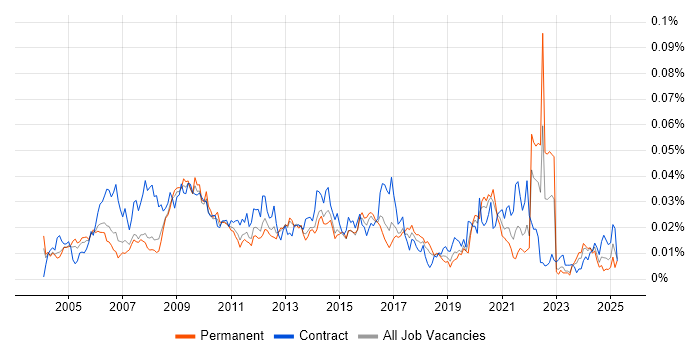Shareable Content Object Reference Model (SCORM)
UK > England
The table below looks at the prevalence of the term SCORM in permanent job vacancies in England. Included is a benchmarking guide to the salaries offered in vacancies that cited SCORM over the 6 months leading up to 17 September 2025, comparing them to the same period in the previous two years.
| 6 months to 17 Sep 2025 |
Same period 2024 | Same period 2023 | |
|---|---|---|---|
| Rank | 647 | 742 | 721 |
| Rank change year-on-year | +95 | -21 | +301 |
| Permanent jobs citing SCORM | 3 | 7 | 1 |
| As % of all permanent jobs advertised in England | 0.007% | 0.010% | 0.002% |
| As % of the Miscellaneous category | 0.017% | 0.032% | 0.004% |
| Number of salaries quoted | 1 | 6 | 1 |
| 10th Percentile | - | - | - |
| 25th Percentile | £58,000 | - | - |
| Median annual salary (50th Percentile) | £59,000 | £35,000 | £40,000 |
| Median % change year-on-year | +68.57% | -12.50% | -6.38% |
| 75th Percentile | £60,000 | - | - |
| 90th Percentile | - | - | - |
| UK median annual salary | £59,000 | £35,000 | £40,000 |
| % change year-on-year | +68.57% | -12.50% | -6.38% |
All Generic Skills
England
SCORM falls under the General and Transferable Skills category. For comparison with the information above, the following table provides summary statistics for all permanent job vacancies requiring generic IT skills in England.
| Permanent vacancies with a requirement for generic IT skills | 18,040 | 22,074 | 22,463 |
| As % of all permanent jobs advertised in England | 41.81% | 32.13% | 41.14% |
| Number of salaries quoted | 9,145 | 11,748 | 16,089 |
| 10th Percentile | £28,750 | £31,250 | £35,000 |
| 25th Percentile | £37,000 | £43,742 | £46,250 |
| Median annual salary (50th Percentile) | £55,000 | £60,000 | £64,811 |
| Median % change year-on-year | -8.33% | -7.42% | +3.70% |
| 75th Percentile | £78,750 | £83,750 | £85,000 |
| 90th Percentile | £105,950 | £112,500 | £110,000 |
| UK median annual salary | £55,000 | £60,000 | £62,500 |
| % change year-on-year | -8.33% | -4.00% | - |
SCORM
Job Vacancy Trend in England
Job postings citing SCORM as a proportion of all IT jobs advertised in England.

SCORM
Salary Trend in England
Salary distribution trend for jobs in England citing SCORM.

SCORM
Job Locations in England
The table below looks at the demand and provides a guide to the median salaries quoted in IT jobs citing SCORM within the England region over the 6 months to 17 September 2025. The 'Rank Change' column provides an indication of the change in demand within each location based on the same 6 month period last year.
| Location | Rank Change on Same Period Last Year |
Matching Permanent IT Job Ads |
Median Salary Past 6 Months |
Median Salary % Change on Same Period Last Year |
Live Jobs |
|---|---|---|---|---|---|
| London | - | 2 | £59,000 | - | 4 |
| South East | +46 | 1 | - | - | 1 |
| SCORM UK |
|||||
SCORM
Co-occurring Skills and Capabilities in England by Category
The follow tables expand on the table above by listing co-occurrences grouped by category. The same employment type, locality and period is covered with up to 20 co-occurrences shown in each of the following categories:
